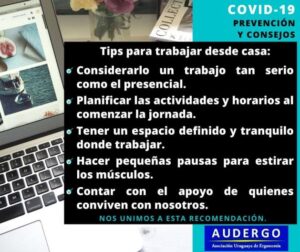
IEA President Kathleen Mosier has circulated this message to IEA societies and stakeholders around the world:
“In this challenging time for everyone, the field of human factors/ergonomics has much to contribute.
“The stories below are illustrations of how some IEA societies are responding to the COVID-19 outbreak.
We wish you all health and safety as we confront the challenges that are before us.”
Kathleen L. Mosier, Ph.D.
President
International Ergonomics Association
From CIEHF
The Chartered Institute for Ergonomics and Human Factors (CIEHF) has launched a podcast series in response to COVID-19. The first episode is focused on how to stay physically and mentally fit whilst working from home. It is aimed at the general public and we would encourage you to post it and share it as widely as possible.
Episode 2 will focus on advice and guidance to key workers in the health sector and will be produced with input from the British Occupational Hygiene Society (BOHS), Society of Occupational Medicine (SOM), International Institute of Risk and Safety Management, and others from NHS bodies. It will follow Government and NHS guidelines that pull together important information from the plethora of emails key workers are receiving but either have no time or are too tired to read.
Episode 3 will focus issues concerning fatigue, human error, and aspects of Personal Protective Equipment and safety.
CIEHF will be contributing to a fortnightly digest on matters relating to COVID-19 with the BOHS and SOM. A joint Occupational Health and Safety Forum has been created which we are contributing to.
The next edition of the Ergonomist will include a feature on living and working in the era of COVID-19, with contributors from many other professional bodies.
The CIEHF webinar series will be relaunched in April and will include a session on how to conduct HF work remotely and more.
Our Annual conference EHF/ODAM 2020 will now go virtual. It will consist of presentations and discussions over two days in the form of interactive webinars, with slide shows, podcasts and videos. New marketing material will follow within the next 48hours. Registrations are open with 25% of the tickets sold.
From HFES
The influx of new, daily developments regarding the spread of the novel coronavirus (COVID-19) has created great uncertainty and anxiety. We could not have known earlier this month that events would lead the Society to make the difficult decision to cancel one of our premier educational activities—the Human Factors and Ergonomics in Health Care Symposium. We did this to ensure the safety of our registrants, speakers, exhibitors, chairs, guests, and staff. Just days after making this decision, we rapidly organized an informative and successful Town Hall session on March 11, Facing the Coronavirus (COVID-19) Human Factors Considerations. This forum was recorded and is available here.
Many of our members serve in roles in clinical settings that are mobilizing to respond to the pandemic. Others are consumed with advancing their work in the face of a changed landscape with increased social isolation, managing staff remotely, and otherwise continuing to operate as normally as possible in a very abnormal time. We have family, friends, and loved ones to be there for and support. It will be stressful at times, but know that you are not alone. HFES is your family and is here for you.
M Susan Hallbeck, Ph.D.
President
Human Factors and Ergonomics Society
From JES:
The Japan Human Factors and Ergonomics Society (JES) has launched a discussion on ergonomics strategic plans against the coronavirus disease (COVID-19) outbreak
The World Health Organization (WHO) declared the new coronavirus (COVID-19) as pandemic on 11 March 2020. The Human Factors and Ergonomics (HF/E) community can contribute not only to mitigating social anxiety under the CBRNE* disaster through risk communication, but also to providing multifaceted solutions by applying ergonomics methodologies, approach, knowledge, and perspectives to this pandemic.
HF/E applies theory, principles, data, and methods to design in order to optimize human well-being and overall system performance, meaning that the HF/E community can also provide practical ways to balance and optimize public health measures and economic / social impacts of long-lasting social activities against COVID-19.
Public health emergencies, in general, require interdisciplinary and comprehensive systems approaches in collaboration with stakeholders. The Japan Human Factors and Ergonomics Society (JES) has begun working with our council members, society members, and stakeholders to take initiatives as follows:
1. Collecting articles on how HF/E can contribute to mitigating the crisis against the COVID-19 outbreak as special articles, now discussing with the editorial board of the Japanese Journal of Ergonomics.
2. Enhancing social communications between academia and stakeholders via social media and the Internet. Prof. Shimomura, the vice-president of JES, is taking a powerful initiative in discussing how HF/E can contribute to sharing practical good practices already introduced in occupational and social communities for preventing COVID-19 outbreaks.
3. Collecting and spreading information of ergonomics good-practice samples in practice against the COVID-19 via the JES website. We will find various ergonomics good practice samples such as ergonomic guidelines for tele-working, introduction of staggered working hours as ergonomic devised ways to reduce infection risk, or hand-washing as standard precautions.
4. The CPE body in Japan also began collecting information on how CPEs are implementing relevant practices in their companies.
5. JES has prepared an ad hoc technical committee on scientific communications for developing HF/E recommendations for crisis and emergency risk communication (CERC) among stakeholders to promote appropriate understanding and behavioral change against social anxiety caused by the COVID-19 outbreak.
6. We are conducting urgent online surveys for JES members working at educational institutions. We will collect data on how each educational institution has communicated measures against COVID-19 to university personnel, and ask to what extent precautionary measures against COVID-19 are being adhered to. We will release the survey results immediately via the JES website and use it as basic information to organize the issues to be addressed against COVID-19 by the JES.
*CBRNE disasters: the chemical, biological, radiological, nuclear and explosive disasters
Ryoji Yoshitake, Ph.D., CPE
President
Japan Human Factors and Ergonomics Society (JES)
We are living in times of uncertainty and concern. For this reason we want to send you a message of solidarity from AUDERGO and tell you about the actions we have been developing:
• Agreement with CTHPA and SMTU for postponement of the CIHSPA 2020 Congress for October 5-7, 2020.
• Suspension of the Seminar “Tools for collaborative design of ergonomics projects” scheduled for March 14. Arrangements are being made with Universidad Católica del Uruguay to be able to offer it 100% on-line through its platform.
• Dissemination of recommendations from the Ministry of Public Health through the website www.audergo.org and social networks (Twitter, LinkedIn, Facebook).
• Offer of publications in pdf format through the website www.audergo.org
• Incorporation of electronic payment means by deposit in BROU account.
• Development and dissemination of “ergonomic information capsules” of which we attach examples:
Those who need it know that they can count on the AUDERGO community, together we will manage to overcome this situation.
Mgtr. María Pascale, Secretaria
Mgtr. Marcelo Scavone, Presidente
From ASOERGVE Venezuelan Society of Ergonomists
Dear Colleagues,
Attached you will find a document prepared by ASOERGVE, associated with COVID19. It is part of the measures that were implemented in the Bolivarian Republic of Venezuela.
Prof. Rafael Gonzáles
President, Venezuelan Society of Ergonomists
Protección de la salud del personal sanitario covid_19
(in Spanish)

